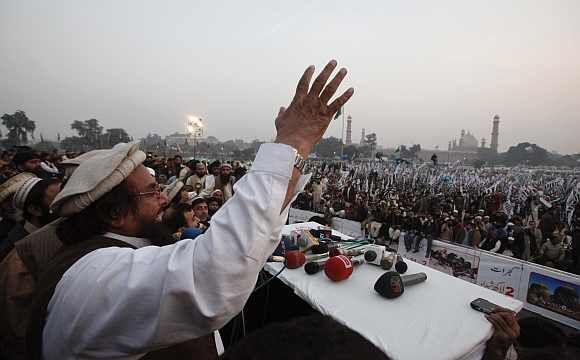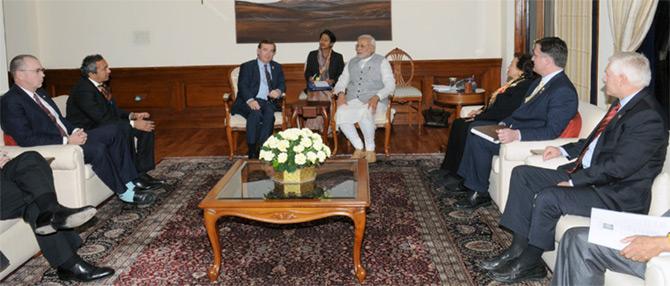'What is the ISI doing and why can't they understand for their own interest that bringing stability to the region will help all the countries become prosperous, whereas a continuation of incitement will only lead to misery for all.'
US Congressman Ed Royce briefs Aziz Haniffa/Rediff.com on his discussions with Prime Minister Modi in an exclusive interview.
 United States Congressman Ed Royce, who led a bipartisan Congressional delegation to India between March 7 and 10, says strategies on how US and Indian counter-terrorism and intelligence cooperation can be ramped up was the top priority on the agenda of their discussions.
United States Congressman Ed Royce, who led a bipartisan Congressional delegation to India between March 7 and 10, says strategies on how US and Indian counter-terrorism and intelligence cooperation can be ramped up was the top priority on the agenda of their discussions.
Royce, who called this correspondent from New Delhi to report on his meetings with the prime minister and other ministers, said another priority on the delegation's agenda was how US-India bilateral trade can be upped to $500 billion.
The Congressional delegation also met Finance Minister Arun Jaitley, Defence Minister Manohar Parrikar, National Security Advisor Ajit Kumar Doval, Home Minister Rajnath Singh and External Affairs Minister Sushma Swaraj.
"On counter-terrorism, I brought up the importance of bringing our top leadership from Homeland Security and our top leadership of intelligence agencies to meet with the top leadership in India so that we can bring it to the highest levels of cooperation because of the growing threat that our people in the United States and India face the same threat," Royce said.
"The threat is such -- and the magnitude of it so great -- that we have to counter it jointly," he said.
Royce, recalling his stay at the Taj hotel and his meetings with security officials following the 26/11 terrorist attacks in Mumbai, said, "We agreed that we need stronger steps with respect to countering these terrorists from Pakistan."
Both sides, Royce said, had bemoaned that the leaders and main conspirators of the 26/11 attacks were still at large and moving freely in Pakistan. These terrorists, he added, have been addressing meetings "and have not been brought to justice -- handed over to the International Criminal Court or handed over to Indian officials."
"This is unacceptable and another reason we need this high level of cooperation by our top leadership," Royce said.
Before he left Washington, DC, Royce had told Rediff.com in an exclusive interview, "We have got to stem the flow of radical Islamists in relation with some of the neighbouring States and India's tough neighbourhood there."
"I believe one of the most critical issues is the common threat we face from Islamist radicals and the continuing and unimpaired financing of Al Qaeda and the D Company and the Haqqani network and the LeT (Lashkar-e-Tayiba) and the Jaish-e-Muhammad," Royce had told this correspondent last week.
"This," Royce had argued, "poses a serious concern to the security of both the United States and India, especially in the context of the withdrawal of the coalition forces from Afghanistan."
"The use of fake charities, businesses, the use of hawala and trade-based money laundering outfits from the Gulf States to transport funds to finance terrorist operations in India and South Asia are a grave threat to regional security," Royce had said.
During his telephone call from Delhi, the senior lawmaker said during his discussions with Modi, which included "the future of Afghanistan and what steps can be taken jointly to secure peace there," the role of Pakistan, both vis-a-vis Afghanistan and the role of the Inter-Services Intelligence, was a major concern.
"We focused on the Deobandi schools in Pakistan that have not been closed and the problems that generate with respect to the export of terrorism and how we can jointly cooperate on how to interdict terrorists in the act of carrying out attacks in India," Royce -- Chariman of the powerful House Foreign Relations Committee -- said.
Royce commended Modi on his efforts to reach out to Pakistan. "We had conversations on the discussions with Prime Minister Nawaz Sharif, but in particular, the observation that the civilian government seems to be going in one direction of trying to open up, but the question is always the same one -- what is the ISI thinking."
"What is the ISI doing and why can't they understand for their own interest that bringing stability to the region will help all the countries become prosperous, whereas a continuation of incitement will only lead to misery for all," Royce said.
 Modi, Royce said, also promised to eliminate all the red tape to facilitate US investment and reinforced his pledge of "Minimum Government, Maximum Governance."
Modi, Royce said, also promised to eliminate all the red tape to facilitate US investment and reinforced his pledge of "Minimum Government, Maximum Governance."
The delegation, which included US Congressman Dr Amerish 'Ami' Bera, exhorted Modi and the other ministers to consummate a bilateral investment treaty, so that the two-way trade between the two democracies could exceed US trade with authoritarian China.
"We have $100 billion in trade today and in the last 12 years, this has been a four-fold increase, but we need to get to that $500 billion mark, which is in the range of the trade between China and the US," Royce said.
"I am going to use the chairmanship of the Foreign Affairs Committee to focus on putting India on the map for trade and investment," Royce added, "and show that all studies and reports point out that investment in South Asia and investment in India, has a much higher rate of return because of the rule of law, for example, compared to Beijing."
"And to get a return on that investment, because of being unable to secure the rule of law, Beijing has been very disappointing, whereas India is a market that is growing very rapidly."
"So, with the prime minister and the ministers we met, the question was what steps we can jointly take to make that happen," Royce said, and pointed out that the biggest impediments were the red tape and bureaucracy that still stood in the way of US investment.
He said he had noted in his conversations that "it takes 80 permits to open a hotel here in India, while it takes only six in Singapore."
Royce said he had also reiterated that "We have 3 million Indian Americans who are very successful, many of them willing to invest back in India, and we also have huge businesses across America and everyone is giving India a new look."
"We discussed what can be done to reduce the remnants of the licensing Raj, those remnants of bureaucracy and the answer to that is the prime minister's own pledges for minimum government, maximum governance."
He said he had lauded the prime minister and Jaitley on the government's Budget "on their real commitment to infrastructure and also the focus on reducing the corporate tax rate from 30 to 25 percent, which is more in line with what the average European tax rate is, and will bring additional investment flows into India."
"The prime minister is very much in sync with this strategy of bringing capital and increasing trade from and with the United States and how we can support the efforts of the Government of India and Indian companies to modernise and help create an indigenous manufacturing based here."
But Royce acknowledged that with regard to the US-India civilian nuclear deal, in limbo for over six years, he had brought up the concerns of the American nuclear industry despite President Barack Obama's declaration of a 'breakthrough' during his summit with Modi.
"The US nuclear industry's concerns need to be addressed and conveyed that though the US-India understanding on nuclear liability makes some assurances to US nuclear companies, they are not persuaded, and that it is the companies and not the governments that have to determine if India's Civil Liability Act makes investment possible."
Before he left Washington, Royce had told Rediff.com, "We still have these hurdles because despite these commitments, India is yet to adopt measures to shield US companies from unlimited liability and unfortunately, the announcement -- the agreement -- on this subject doesn't provide the needed changes and simply states that India's existing laws will suffice."
"So, without adequate protection, with open-ended liability, US companies cannot engage in this kind of business in India."
There was a consensus about the "US and Indian converging strategic interests in the broader Asia Pacific region, and also how the US Congress supports both our governments on the need for two-way defence and technology cooperation and collaboration and co-production," he said.
"So we know our goals and the question now is what we can do to accelerate the relationship, so India can achieve the benchmarks that have been set by the new government here."
Images: Top: Lashkar-e-Tayiba terrorist Muhammad Saeed addresses an anti-America and India rally at the Minar-e-Pakistan in Lahore. Photograph: Reuters
Bottom: US Congressman Ed Royce and the Congressional delegation with Prime Minister Narendra Modi. Photograph: Press Information Bureau










